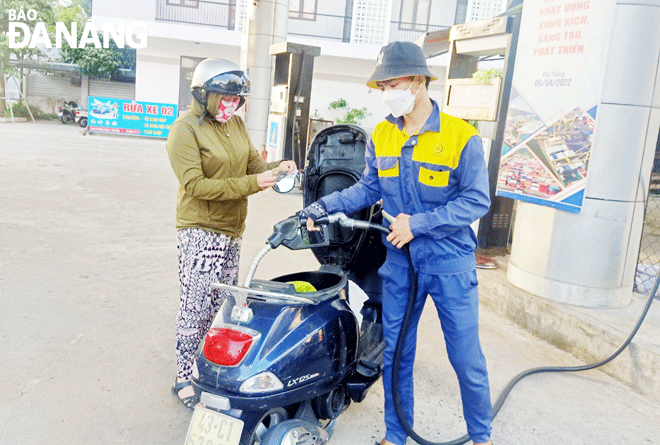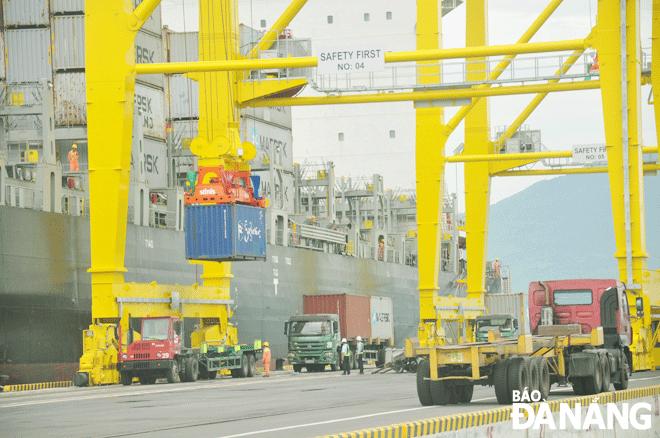Soaring gasoline prices spell more troubles for Da Nang transport firms
Petrol and oil prices have continuously skyrocketed to a record level, directly affecting economic sectors for many days, especially small and medium-sized enterprises operating in the transportation sector.
 |
| Petrol and oil price hikes have been affecting transportation activities. A motorcyclist has her vehicle re-filled at the filling station on February 3 Street, Hai Chau District. Photo: KIM NGAN |
Retail gasoline prices in Viet Nam has climbed to a new peak and hit another all-time record following the latest adjustment by the Inter-Ministry of Industry and Trade - Finance.
Specifically, the retail price of E5 gasoline rose by VND1,490/liter to VND28,950/liter, while that of RON95 gasoline was adjusted up by VND1,550/liter to a maximum of VND29,980/liter.
Meanwhile, the price of diesel oil was up by VND1,120 per litre to VND26,650 ($1.16) per litre. A rise of VND1,340 per litre was also seen in the price of kerosene to VND25,160 ($1.09).
This is the eighth adjustment made to petrol prices since the beginning of this year, with only three decreases, and the third from the end of April.
Will transport fares increase?
Increasing petrol and oil prices amidst a low volume of passengers will be very risky, but keeping the existing fares while there may be no sign of subside is driving transport service providers into huge losses! Many transport businesses are now falling into a "dilemma".
Mr. Tran Thien Thuat, the owner of a passenger coach running on the route Da Nang - Que Luu in Hiep Duc District, Quang Nam Province) lamented, "Normally, the fare for each passenger on this route is about VND120,000 - VND130,000. However, with the continuous price increase over the past time, the service provider has increased the ride fare by 10% to offset the cost.
A representative of the Tung Lam passenger coach travelling on the route Da Nang - Ba Don Town in Quang Binh Province, said that, over the past time, gasoline has soared nearly 40%, having put more pressured on transport enterprises. “If you don't increase the fare, the more your vehicle run, the more you will lose, but if you increase the price, the number of visitors will decrease”, said he.
Currently, the number of passengers onboard each coaches is less than 50% of the designed capacity whereas the petrol price remains high. If the fare is kept unchanged, businesses will suffer heavy losses, and if the transport fare increases, they will lose customers, so the situation is very difficult.
A representative from the Cuong Huynh General Trading and Services Co., Ltd based in Son Tra District said that the company has more than 30 vehicles of 4 - 45 seaters, specialising in serving tourists.
After 2 years of being affected by the COVID-19 pandemic-triggered upheavals, during the recent 4-day public holiday break for the national Reunification Day (April 30) and the International Workers’ Day (May 1), the company's sales were quite good. Like other travel agencies across the city, the company is expecting for a great success of tourism in the coming time, especially in the summer- the peak tourism season.
However, despite the above-mentioned positive signals, the tourism industry has to face the fear of more gasoline price hikes.
When petrol and oil prices increase, transportation costs will also climb up and, of course, tour prices will take an upward trend because transportation accounts for a large proportion of costs in the tour structure. It will be more difficult for travel agencies to build up tour prices. In fact, if the tour price is high, the tour booking numbers may be low, and if the tour price is low, the companies will have to suffer losses.
 |
| Workers are seen loading and unloading goods at the Tien Sa Port. Photo: THANH LAN |
More drastic measures needed to well control gasoline and oil prices
The high price of gasoline and oil has levied a great impact on the operating corporate costs, especially at a time when many businesses have just grappled from the pandemic to resume production and business.
A representative of a transportation business said that, if gasoline prices continue to stay at a high level, a rise in transportation service prices is inevitable. Of course, when the price of transportation services increases, it will lead to spike in the price of most other goods, especially essential goods.
This will put a lot of pressure on price management, especially adversely affecting people's lives.
It is hoped that the national authorities to release a mechanism to control the fare increase made by transport service businesses. Also, they need to use administrative tools, including the Petroleum Price Stabilisation Fund and other measures on taxes and fees.
It is also suggested that relevant agencies reduce the operating cycle of gasoline prices further so that the domestic market can react more quickly to the world petroleum market and make adjustment of business expenses norm in the base price of petrol and oil.
According to the Ministry of Industry and Trade, the world petroleum market witnessed many big changes last week. The EU proposed an embargo on petroleum products from Russia, while the Organisation of the Petroleum Exporting Countries and its allies (OPEC+) did not increase output as proposed by the EU, causing concerns about petroleum supply to the market. Besides that, the crude oil demand increased on the world market after the US announced a plan to buy back 60 million barrels for emergency stockpiles. Those factors pushed the price of finished petroleum products higher.
The Domestic Market Department under the Ministry of Industry and Trade said that if the gasoline prices continue to rise, it is possible to consider reducing the special consumption tax.
The Ministry of Industry and Trade has scenarios for managing petrol prices if the petrol price hits $130 per barrel or $150 on the world market. Accordingly, it will propose to reduce taxes for petrol products, such as environmental protection, special consumption and value-added taxes, and diversify petrol supply.
Reporting by THANH LAN, QUYNH TRANG – Translating by A.THU